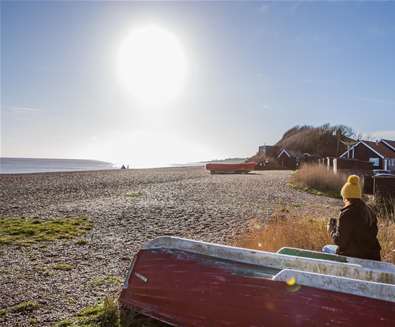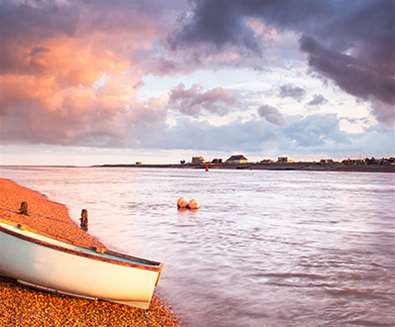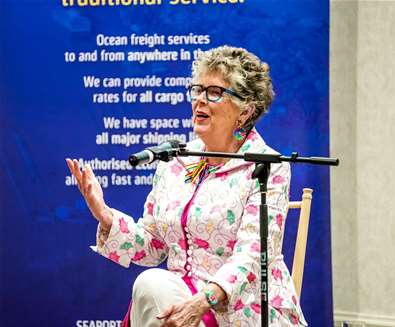Epic stretches of coastline, unassuming villages, wild, unpredictable weather and picturesque agricultural landscapes; with all its beauty and character, it’s little wonder that Suffolk has provided the fuel for many a writer’s creative furnace.
Discover Suffolk’s most famous authors and the stories that have taken place here, and uncover a literature festival worth writing home about!
Authors of The Suffolk Coast

Fans of crime fiction might recognise links to Suffolk in the work of both P.D James and Ruth Rendell, whose thrilling and sometimes dark books of intrigue, mystery and murder were frequently inspired by the county beloved by both authors. P.D James was seemingly inspired by her holiday home in Southwold, which became a pivotal setting in the dystopian tale ‘The Children of Men’. Her most famous character, detective Adam Dalgliesh visits his aunt in Monksmere Head, just south of Dunwich, and Covehithe also features in her novels.
Ruth Rendell lived in both Aldeburgh and Sudbury and wove into her work the Suffolk landscapes she loved so much. Her novel ‘No Night is Too Long’ features both Aldeburgh and Orford and ‘Gallowglass’ is set in Sudbury. Psychological thriller ‘A fatal Inversion’ takes place in the long hot summer of 1976 and centres around a Suffolk Mansion called Wyvis Hall, as well as featuring Polstead and Nayland.
Most visitors to Lowestoft can find a pub by the railway station called ‘The Joseph Conrad’ but perhaps fewer will realise that its namesake is the famous author of ‘The Heart of Darkness’. In 1879, a small British steamer boat named ‘Mavis’ arrived from Marseilles and docked in Lowestoft, aboard it was the young, Ukrainian Conrad at the beginning of his Navel career. He learnt to speak and write English aboard the ship; a language in which he would later pen his most successful novels.
Inspirational Suffolk Coast

Readers have long been fascinated by the vivid characters and enduring stories of Charles Dickens, and his famous novel ‘David Copperfield’ is well known for the Suffolk derivation of its titular character. Copperfield states “I was born at Blunderstone, in Suffolk, or ‘there by’, as they say in Scotland.” It is known that Dickens spent time in nearby Great Yarmouth and stayed at Somerleyton Hall, he was even rumoured to have attended a hanging in Norwich in 1849.
In the 1830’s a young Dickens paid a visit to the Claydon and Bosmere Union workhouse in Barham, where he was investigating social conditions in rural areas. When shown the logbook he was struck by the story of a boy who was apprenticed aged 10, this young lad was the inspiration for the famous story of ‘Oliver Twist’.
Even Britain’s most famous bard, William Shakespeare himself has a wealth of connections to The Suffolk Coast. As an actor during the time when London theatres were besieged by the plague, Shakespeare would have travelled with his company from London and up the coast by boat, bringing all their props, costumes and musical instruments with them.
It is known that he toured to Ipswich, Hadleigh, Lavenham and onto Bury St Edmunds, performing in the courtyards of local inns and at houses of nobility. It was perhaps this local knowledge that lead Shakespeare to include the county in his own plays later on; he references Ipswich School in Henry VIII where Griffiths says of Cardinal Wolsey “Those twins of learning that he raised in you, Ipswich and Oxford! One of which fell with him” and in Henry VII Part II Shakespeare shows the murder of Duke Humphrey at Bury St Edmunds when one of the murderers states “Run to my Lord of Suffolk; let him know we have dispatch’d the Duke, as he commanded”.
Suffolk pops up in works of Children’s literature too and many writers of stories for youngsters have links to the area. Sudbury is the ‘spot’ where the wonderful story ‘101 Dalmatians’ by Dodie Smith, is set. If you visit the water trough opposite Sudbury Town Hall and look closely you will find a plaque, which records the location as the very same place that Pongo pauses to listen out for the twilight bark on his search for the lost puppies.
A visit to The Suffolk Coast should most certainly include a stop in Thorpeness; promoted as 'The Home of Peter Pan'. J.M Barrie, author of 'The Boy Who Wouldn’t Grow Up' (Peter Pan), was a friend of Alexander Ogilvie, who built the Meare and houses which surround it as a fantasy holiday haven for the middle classes. The author regularly visited the village and his characters have inspired the islands in the centre of the famous Meare.
While staying with friends in Woodbridge, beloved author of stories such as Noddy and The Famous Five, Enid Blyton trained to be a teacher at Ipswich High School. Seckford Hall was a great inspiration for Blyton, on account of its supposedly haunted bedrooms and secret passages.
Many people will have fond childhood memories of reading the Swallows and Amazons series by Arthur Ransome, who spent five years in Suffolk, while he wrote the books. In the story ‘We Didn’t Mean To Go To Sea’ an adventurous group of children drift out to sea after strict instructions from their mother to stay on the River Orwell in their little boat. The vessel in question is thought to have been inspired by Ransome’s own boat ‘The Nancy Blackett’ which still exists and can even be hired out from the Woolverstone Marina for your very own nautical adventure!
Literature Festivals on The Suffolk Coast

Aldeburgh Literary Festival - 6th - 9th March 2025
Originated by the owners of The Aldeburgh Bookshop, the festival has previously hosted a multitude of distinguished speakers, among them Nobel and Pulitzer prize winners and even chancellors of the exchequer.
https://www.aldeburghbookshop.co.uk/aldelitfest
Felixstowe Book Festival - 25th - 29th June 2025
A diverse festival with talks and workshops for avid readers of books of all kinds; poetry, fiction and non-fiction, crime, history and much more; there is sure to be something to entice you into a new book.
https://felixstowebookfestival.co.uk/
Poetry in Aldeburgh - November 2025
This wonderful annual event celebrates the heritage of poetry on the Suffolk Coast. The festival offers a varied programme of readings, open mics and fascinating creative workshops, interspersed with dinners, discussions and even ‘poetry walks’around the town.
https://www.poetryinaldeburgh.org/